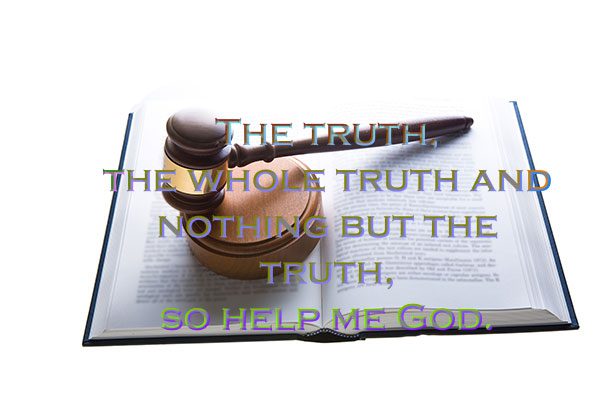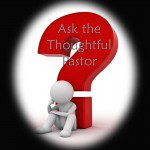When I speak a “truth” that makes me look better and others look worse, the chances are 100% that I’m way off base from God-truth.

Dear Thoughtful Pastor: The last election cycle and the first 100 days of the Trump administration have lead me to this question.
The commandment, “Thou shall not bear false witness,” seems fairly straightforward. For most of us that means to try your best to tell the truth and don’t choose your words to purposely mislead, equivocate or omit information to purposely lead to falsehoods. Intuitively, I think we all sense when we aren’t being truthful.
Politicians have turned evasion, attacks on unwanted facts, omissions, generalizations that permit backtracking and flat out lies based on “alternative facts” into an art form. Every day it seems fact check websites are on the verge of a meltdown.
My question – in the new reality of the Internet, is the commandment to tell “The Truth” even possible? The implications of the emerging acceptability of choosing your own reality is very troubling.
Foundational to any healthy relationship is the assumption of truth: that what we hear and what we say will be true.
I worked once with some adults who were at risk of losing custody of their children. I mentioned the importance of assuming their children speak truth. One man said, “What do you do when you know for sure they are lying?”
Asked to describe the situation, he responded, “Every day, when my son gets home from school, I ask him if he stayed out of trouble that day. He always says he did, but I often find out later that he didn’t .”
I asked, “What would you do if he told you that he HAD misbehaved?”
The father answered, “I’d haul off and hit him because he shouldn’t have done something wrong at school, of course.”
I suggested his father see it this way: the truth behind his son’s apparent lie is, “I am afraid my dad will hit me.”
We more readily accuse others of lying than working to discover the truth behind the words. The moment we accuse someone of lying, we immediately make it nearly impossible to create the kind of atmosphere where all can speak freely. Accusations like “You lie!” cause impenetrable barriers rise, eliminating the possibility of real, productive relationships. Trying to understand the other keeps conversation going.
Is there an Absolute Truth?
The big question: Is there some objective, absolute, indisputable truth we can call upon?
I think there is and believe we find it in the nature of God. However, I don’t think humans have gained much skill in dissecting those absolute truths. We all suffer from the desire to see that any indisputable truths support the decisions we have already made about the world around us.
Most have honed skills to bend anything we see in our favor. We are also quite clever in finding ways to use what we see for the detriment of those we have classified as “enemy” or “other.”
So, here’s another technique I have learned: When I speak a “truth” that makes me look better and others look worse, the chances are 100% that I’m way off base from God-truth.
Suppose that God-truth says, “All creation is good and redeemable. All humans are worthy of dignity because all bear the mark of the image of the Creator upon them.”
In that God-truth, should I reduce the status of any other person to that of an object rather than fully human, I have walked away from real truth.
But we do this all the time. Other people, instead of being also being human, full of complex needs and pasts and hopes and desires, become to me objects that either support me or stand in opposition to me.
Fear is always behind lies
So, let’s return for a moment the world of “alternative facts,” evasions and outright lies that do indeed dominate our current political world. What is the truth behind these assertions?
Think again about our little boy who must face his father at the end of every school day. What is his major emotion? Fear.
Fear generally stands behind any need to lie. Fear of loss, of rejection, of pain, of failure, of exposure. We all share them.
Note: I make the assumption what we see as lies do not come from someone with certain mental illnesses, which can indeed alter one’s perception of reality. If indeed the current political spin comes from mental illness rather than the need to keep fears at bay, we have a whole different problem.
But assuming basic mental health, those who love truth have a task. We all need to face our fears and speak truth to ourselves about them and how they motivate us to be less truthful. Then we have gained both strength and moral authority to ask others to do the same.
I am convinced truth will eventually win. Lies end up producing such entanglements that chronic speakers of untruths always get trapped in their complex webs. We have every right to call out lies, but we must do so with redemptive hope, not hateful and demeaning accusations.
 [Note: a version of this column is slated to run in the March 10, 2017, edition of the Denton Record-Chronicle. The Thoughtful Pastor, AKA Christy Thomas, welcomes all questions for the column. Although the questioner will not be identified, I do need a name and verifiable contact information in case the newspaper editor has need of it. You may use this link to email questions.]
[Note: a version of this column is slated to run in the March 10, 2017, edition of the Denton Record-Chronicle. The Thoughtful Pastor, AKA Christy Thomas, welcomes all questions for the column. Although the questioner will not be identified, I do need a name and verifiable contact information in case the newspaper editor has need of it. You may use this link to email questions.]
















